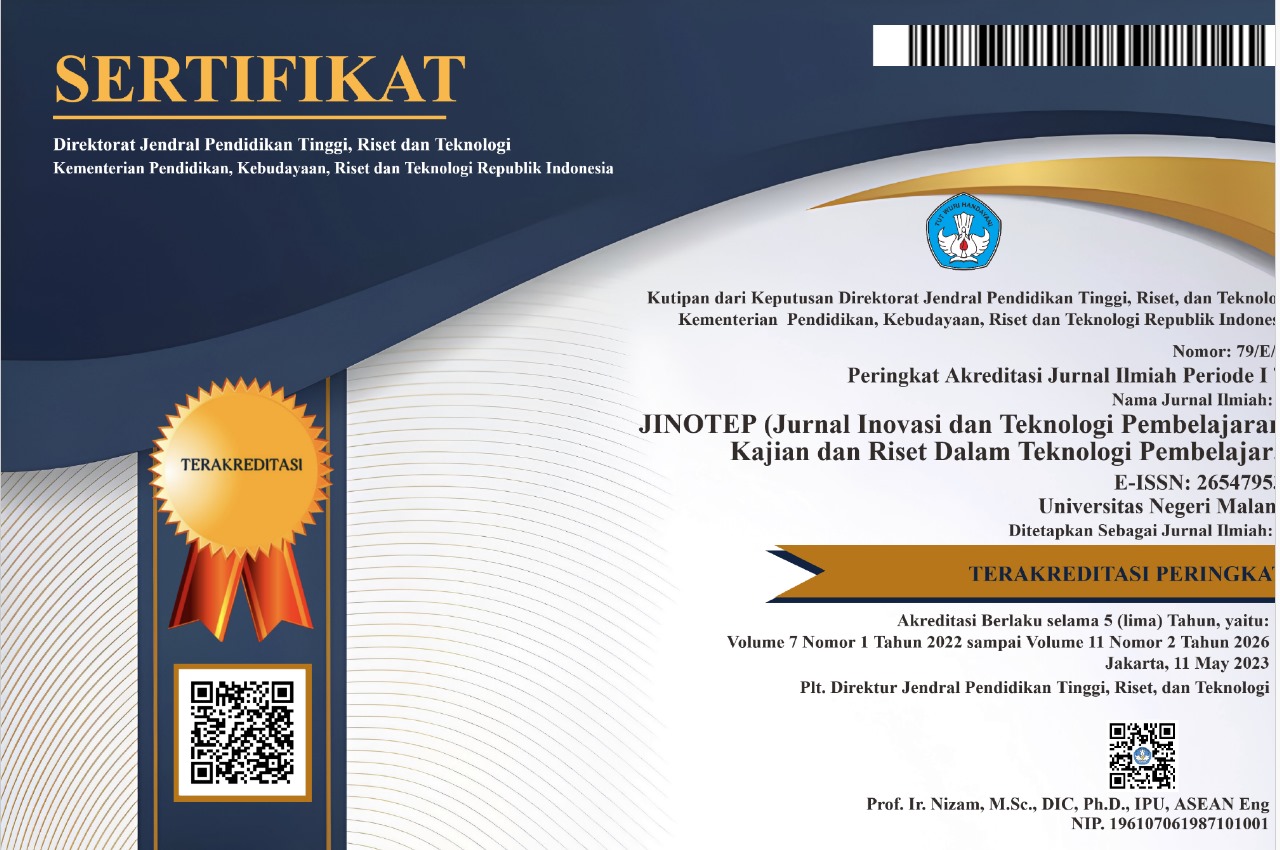Pengembangan Strategi Motivasional Pada Mata Pelajaran PKN Dalam Meningkatkan Prestasi dan Motivasi Belajar Siswa SMP
Abstract
Abstrak: Penelitian ini bertujuan untuk mendeskripsikan: prestasi belajar siswa dalam matapelajaran PKN pada enam kecamatan di 3 Kabupaten yang ada di SULUT; motivasi belajar siswa SMP pada 6 kecamatan di 3 kabupaten Minahasa; strategi pengelolaan motivasional yang dilakukan guru-guru SMP pada 6 kecamatan di Kabupaten Minahasa; dan mengembangkan model rancangan motivasional untuk matapelajaran PKN. Rancangan penelitian ini terdiri dari dua jenis, yaitu: (1) deskriptif prestasi belajar melalui survey dan (2) pengembangkan model Pembelajaran motivasional Matapelajaran PKN SMP. Instrumen yang digunakan untuk memperoleh data motivasi belajar siswa dan strategi motivasional disusun oleh tim peneliti.Subjek penelitian : siswa SMP di enam kecamatan di Kabupaten Minahasa yang mewakili kecamatan yang besar, sedang, dan kecil yaitu siswa serta guru bidang studi PKN di SMP. Untuk uji ahli terdiri atas Ahli Isi, Media, dan Ahli Rancangan.Analisis data yang dipakai untuk memperoleh data motivasi belajar siswa, strategi motivasional yang dilakukan guru adalah analisis deskriptif. Sedangkan untuk mengembangkan model adalah analisis deskriptif berbentuk prosentase kesepakatan di antara para ahli dan subyek penelitian.. Hasil penelitian ini akan dapat digunakan secara langsung oleh perancang pembelajaran yang berupa pedoman dan langkah-langkah dalam merancang pembelajaran yang memperhitungkan aspek motivasi. Sedangkan bagi guru akan diperoleh preskripsi dalam hal bagaimana menerapkan rancangan motivasional dalam pembelajaran PKN Di SMP.
Abstract: This study aims to describe: student learning achievement in PKN courses in six sub-districts in 3 districts in the North Sulawesi; learning motivation of junior high school students in 6 sub-districts in 3 Minahasa districts; motivational management strategies conducted by junior high school teachers in 6 sub-districts in Minahasa District; and develop a motivational design model for PKN learning. The design of this study consisted of two types, namely: (1) descriptive learning achievement through surveys and (2) developing motivational learning models for PKN SMP learning. The instruments used to obtain data on student learning motivation and motivational strategies were compiled by the research team. Subjects of study: junior high school students in six sub-districts in Minahasa District representing large, medium, and small sub-districts, namely students and PKN study teachers in junior high school. For an expert, the test consists of Content Experts, Media, and Design Experts. Data analysis used to obtain data on student learning motivation, motivational strategies conducted by the teacher is descriptive analysis. While to develop the model is a descriptive analysis in the form of a percentage of agreement between experts and research subjects. The results of this study will be used directly by the learning designer in the form of guidelines and steps in designing learning that takes into account the motivational aspects. As for the teacher, a prescription will be obtained in terms of how to apply motivational design in learning PKN in junior high school.
Keywords
Full Text:
PDFReferences
Ardhana, W. 1994. Siswa Memerlukan Tantangan, Bukan Keberhasilan yang Diraih dengan Mudah. Makalah Disampaikan dalam Seminar Sehari tentang Peningkatan
Sumber Daya Manusia dalam Menyongsong Kurikulum 1994 di Universitas 17 Agustus 1945 Surabaya.
Bloom, B.S. 1976. Human Characteristic and School Learning. New York:McGraw-Hill.
Colley, W.W. & Lohnes, P.R. 1976. Evaluation Research of Education. New York: Halsted
Elliot, S.N., Kratochwill, T.R., Littlefield, J., & Travers, J.F. 1996. Educational Psychology (2nd Ed.). Madison: Brown & Benchmark
Ford, M. 1992. Motivating Humans. Newbury Park, CA: Sage.
Gagne, R.M. 1977. The Condition of Learning (3rd ed). New York: Holt Rinehart & Winston.
Keller, J.M. 1978. Motivational Need Game. National Society for Performance and Instruction Jurnal, 17(6), 3-4, 21.
Keller, J.M. 1979. Motivational and Instruction Design. Journal of Instructional Development 2(4), 26-34.
Keller, J.M., Goldman, J.A., & Sutterer, J.R. 1978. Locus of Control in Relation to Academic Attitudes and Performance in a Personalized System of Instruction Course. Journal of Educational Psychology, 79, 414- 421.
Keller, J.M. 1983. Motivational Design of Instruction. Dalam Reigeluth, C.M. (Ed.) 1983. Instructional-Design Theories and Models: An Overview of their Current
Status. Hillsdale, New Jersey: Lawrence Erlbaum Associates.
Keller, J.M. 1987. Application of the ARCS
Model of Mativational Design. Dalam Reigeluth, C.M. (Ed.) 1987. Instructional Theories In Action: Lessons Illustrating
Selected Theories and Models. Hillsdale, New Jersey: Lawrence Erlbaum Associates.
Keller, J.M. 1996. Motivation in instructional design. Dalam T. Plomp & D.P. Ely (Ed). International Encyclopedia of
Educational Technology (2nd Ed). New York: Pergamon.
Reigeluth, C.M. 1979. In search of a Better Way to Organize Instruction. Journal of Instructioanl Development, 2(3), 8-14
Reigeluth, C.M & Merrill, M.D. 1979. Classes of Instructional Variables. Educational Technology, March, 5-24.
Weiner, B. 1990. History of motivational research in education. Journal of Educational Psychology, 82
DOI: http://dx.doi.org/10.17977/um031v1i12014p105
Refbacks
- There are currently no refbacks.
Copyright (c) 2014 Marthinus Mandagi

This work is licensed under a Creative Commons Attribution-ShareAlike 4.0 International License.
======================================================================
Jurnal Inovasi dan Teknologi Pembelajaran published by Universitas Negeri Malang in collaboration with the Asosiasi Program Studi Teknologi Pendidikan Indonesia (APS TPI) and Ikatan Profesi Teknologi Pendidikan Indonesia (IPTPI) with a MoU.
Publisher Address:
Educational Technology Laboratorium, Building D5, 1st Floor
Faculty of Education, Universitas Negeri Malang
Semarang St. No. 5, Malang City, East Java Province, Postal Code 65145
Email: jinotep.fip@um.ac.id
======================================================================

JINOTEP is licensed under a Creative Commons Attribution-ShareAlike 4.0 International License.
JINOTEP Statistics (Since July 13th, 2020)


.png)




.png)
1.png)
1.png)
4.png)
2.png)
1.png)
1.png)
.png)


_3.png)





1.png)
.png)